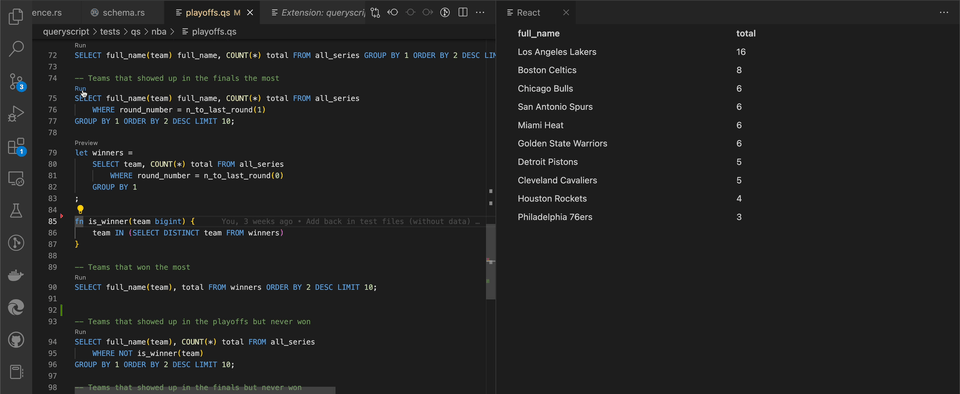queryscript
| Crates.io | queryscript |
| lib.rs | queryscript |
| version | 0.1.4 |
| created_at | 2023-02-09 04:44:35.757591+00 |
| updated_at | 2023-03-09 06:47:01.483673+00 |
| description | Queryscript is a SQL-based language that allows you to use higher order abstractions like variables, functions, and modules alongside SQL queries. |
| homepage | https://github.com/qscl/queryscript |
| repository | https://github.com/qscl/queryscript |
| max_upload_size | |
| id | 780485 |
| size | 1,555,650 |
documentation
README
QueryScript
QueryScript is a strongly typed programming language that builds on SQL. It provides modern tooling, modularity, and integrations with popular relational databases. QueryScript is built for application business logic, transformations, ETL, and visualization.
- SQL and more. Queryscript is a powerful programming language with variables, functions, and modules. SQL is a first class concept in the language.
- Write once, run anywhere. QueryScript typechecks your data model and queries, ensuring your code will run against any database backend without porting.
- Performance always. QueryScript is built in Rust and can run natively in your Typescript and Python apps. It pushes down as much compute as possible into the underlying relational database.

Below, we'll walk through some examples and installation instructions. You can run QueryScript locally, making it simple and fun to develop in tools like VSCode. For a more detailed walkthrough of the language, check out the QueryScript website.
Example
Here's a quick example of QueryScript:
-- Variables (including relations) are namespaced and can be imported. The below queries will
-- work for any definition of `users` and `events` as long as they typecheck.
import users, events from schema;
-- You can define variables (including scalars and relations)
-- using `let <name> [<type>] = <expr>`. These expressions are
-- lazily evaluated (and potentially inlined), so there is no
-- cost to defining them.
let active_users = SELECT * FROM users WHERE active;
-- You can run queries inline to help with debugging
SELECT COUNT(*) FROM active_users;
-- You can define functions that operate over values. Just like
-- variables, functions can be inlined and pushed down into the
-- target database, or evaluated directly.
fn username(user_id bigint) {
SELECT name FROM active_users WHERE id = user_id
}
-- Find the users with the most events
SELECT username(user_id), COUNT(*) FROM events GROUP BY 1 ORDER BY 2 DESC LIMIT 10;
-- Find the users who are at risk of churn
SELECT username(user_id), MAX(ts) FROM events GROUP BY 1 HAVING MAX(ts) < NOW() - INTERVAL 1 MONTH;
-- You can also define functions over relations
fn most_popular_events(events) {
SELECT name, COUNT(*) num FROM events ORDER BY 2 DESC
}
-- And see the most popular events globally
most_popular_events(events);
-- Or per user (this will return a sorted array of events
-- for each user)
SELECT username(user_id), most_popular_events(e) FROM events e GROUP BY 1;
Installation
Right now, the only way to install QueryScript is to build it from source. We'll enable a more streamlined install in the coming weeks.
Building from source
To build QueryScript from source, you'll need Git, Rust, Clang++.
git clone https://github.com/qscl/queryscript.git
cd queryscript
git submodule update --init
cargo build --release
The QueryScript compiler will be available at target/release/qs.
Building development environment
If you'd like to contribute or otherwise hack on QueryScript, you'll need a few more dependencies: Python >= 3.7, Python venv, Git LFS, Node.js, Yarn, and Docker Compose.
First, run the above commands (although you can skip cargo build --release). Then, run
make develop
Beyond compiling the Rust library and qs binary in debug mode, this command will also:
- Setup a python package named
qsutilsinside of a virtual environment with some utility scripts for downloading test data - Install pre-commit hooks (inside of the virtual environment).
- Install the VSCode extension's dependencies and compile it.
- Download test files via
git-lfs
Please run make develop if you plan on making any contributions. You can run the test suite with make test.